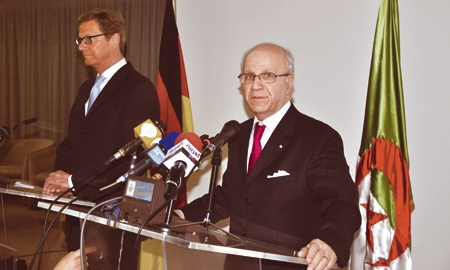Just one year after Algeria declared independence from France, Germany stepped in – not to colonise or exploit, but rather to establish a cultural relationship. It was in 1963 that the Goethe Institute was established in Algiers, making German the third foreign language spoken by Algerian students, after French and English.
From cultural exchanges, Algeria and German soon moved on to forming a solid trade relationship. By 2010, Algerian exports to Germany totalled 6.93€ billion (5.6€ billion), with petroleum products taking up the largest share, at nearly 96%. In contrast, German exports to Algeria reached €1.4 billion, or 5.8% of total Algerian imports. These were mainly from the automotive sector, as well as industrial machinery, chemicals and electrical equipment.
Since independence, Germany has lent Algeria a helping hand in terms of national development through technical cooperation. To date, this has amounted to some €200 million. Nevertheless, German-Algerian relations really kicked off a decade ago when, in April 2001, an Algerian president – President Bouteflika – visited Germany. He later returned in 2010, and in between his visits, Chancellor Angela Merkel made an official visit to Algeria in 2008. In that year, an investment protection agreement, a shipping agreement and a double taxation agreement the two countries had signed entered into force.
Since 2001, the relations of cooperation between the two nations have been characterised by an important flux of exchanges that has unveiled the excellent business and investment opportunities that Algeria’s economy offers. Already, more than 200 German companies have a presence in Algeria.
During President Bouteflika’s 2010 visit, the Algerian-German Joint Economic Commission was established and later met for the first time in Berlin in the spring of 2011. According to German Minister for Foreign Affairs Guido Westerwelle – who in January this year was invited for an official two-day visit to Algeria by his counterpart, Mourad Medelci – the commission is “a forum where business people from both countries examine the ways and means of identifying areas where partnerships can be created.”
At the March 2011 meeting in Berlin, talks focused on renewable energies, transport and infrastructure, investments, the health sector, and initial and further training. Algerian Minister of Industry, SMEs and Investment Promotion Mohamed Benmeradi highlighted Algeria’s interest in diversifying economic relations, and Dr Bernd Pfaffenbach, State Secretary at the Federal Ministry of Economics and Technology, said that Algeria is an important partner for Germany in North Africa.
The Joint Economic Commission met again in late April this year, this time in Algiers and headed by Minister Benmeradi and State Secretary at the Federal Ministry of Economics and Technology, Anne Ruth Herkes, who said that Algeria is still “an attractive destination for investment” and that it will remain so. Minister Benmeradi that “the most important partnership undertaken by Algeria since 2009 with foreign countries is embodied by Germany” and underlined the meeting’s potential for establishing and developing business partnerships, particularly with the German mechanical industry.
The two-day meeting ended with the signing of a treaty to strengthen Algerian-German bilateral economic relations, with a special emphasis on health, cement production and energy.
The work done through the commission undoubtedly supports the trade relations already being encouraged by the German-Algerian Chamber of Industry and Commerce (AHK Algeria), which was founded in 2006 and already lists some 700 members among its ranks. Between June and December 2011, AHK Algeria scheduled about 10 information days and economic forums in Germany to promote business opportunities in Algeria and to inform German businesses on the north African country’s current regulations.
Algerian Minister of Foreign Affairs Mourad Medelci points out that the Government is “delighted with the quality of our relations and we are convinced that Germany’s exceptional position, as a recognised force, and the quality of its technology are assets more likely to help develop our cooperation even more.”
German direct investment in Algeria totalled some €350 million in 2010, which included the formation of several major joint ventures, among which are for production of industrial gas and railway electrification. German companies in Algeria are also very active in the development of renewable energy production, as seen in Desertec, a €400 million project that intends to tap the renewable energy potential of the Algerian desert to produce huge amounts of electric power. Indeed, Desertec could become “one of the pillars” of cooperation between Germany and Algeria, says Minister Westerwelle.
Algeria’s $286 billion National Development Plan 2010-2014 has opened the way for greater foreign investment, and its launch saw the volume of German exports to Algeria in 2010 rise by 32% to 1.4 billion euros.

0 COMMENTS